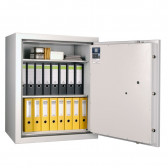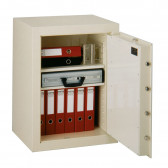In theory, each of us - both in our personal lives and in business - should be prepared for financial problems.In practice, however, most people do not think about securing their capital if the danger is not visible on the horizon. Now, however, the threat is extremely real. Therefore, anyone who has not yet started preparing for a financial crisis should think about implementing the practices we have suggested as soon as possible.
Building up cash reserves
Diversifying savings is one of the best solutions for anyone who is serious about securing their finances. In times of crisis, cash is the most valuable asset, so it's a good idea to have cash reserves on hand. Investments in real estate, works of art, antiques and numismatic items are often very valuable, but in times of crisis they can be difficult to cash. Therefore, maintaining cash reserves is a priority – they should be our "financial cushion" when difficulties with maintaining financial liquidity arise. However, you shouldn't hide the cash you have saved under your mattress or in a sock. You can keep the money in a bank account, but if you find this unprofitable, the most convenient solution is to store it in a safe. Hartmann Tresore has no shortage of small safes ideal for use at home or in the study.
Read also: Negative interest rates on savings. Is it still worth depositing money in savings accounts?
A solid budget analysis
Having savings is not everything, however. To responsibly manage your finances you need to know how much money you actually have and, more importantly, for how long it will last. Without a thorough analysis of your household or business budget, it may turn out that the real savings you have at your disposal are insufficient, and that the funds you have accumulated so far have only given you a false sense of security.
Check our range: home safes!
Non-payment of loans
When analysing your financial situation, it is worth taking a look at the loans you are paying. With a large financial surplus – yes – you can overpay, but it is not always worth it. Why? Some people are afraid of inflation and high interest rates, but it is worth noting that in the case of crises, central banks lower interest rates to stimulate the economy. Thus, the cost of credit decreases.
Eliminating unnecessary expenditure
This budget analysis not only reveals to us the honest truth about our financial capabilities, but also enables us to take the next steps. Thanks to an honest analysis we can identify weak points, see what gives us opportunities for additional savings and what expenses can be reduced. Finding and eliminating unnecessary expenses is key in this case. Economy class instead of business class on a plane? A small hotel instead of a luxury resort? Buying good trade books and magazines instead of an expensive course? A used car in good condition instead of a new one? Why not!

Counting on an annual basis
Are we losing money on interest for late payments that we simply forget about? Are we paying a fixed amount for account maintenance when there are plenty of offers for free accounts? Are we running out of cash, on subscriptions for something we don't use? Such seemingly small amounts together generate large and completely unnecessary costs. That is why it is worth counting the expenses annually. 30, 50 or 70 PLN is not much, but multiplied by 12 months it gives a significant sum.
Reviewing documents
At a time when the financial crisis becomes real, it is also worth taking a look at the contracts concluded with banks and insurers. Perhaps we will be able to take advantage of a credit holiday or our insurance policy guarantees protection in case of loss of sources of income? It's worth knowing about this beforehand. And what if we don't have any protection? This could be the last moment to consider buying a policy.
Planning
Planning is always worthwhile, but in times of crisis it is especially important. Knowing what our goals are, what path we want to follow and how much it will cost us makes it easier to avoid mistakes and make sensible decisions. And it does not matter whether it is a long-term marketing plan for a company, a business or holiday travel plan, or a grocery shopping plan for the coming week. The beneficial effects of planning are always the same.
Read also: Maintaining liquidity at all costs? Wallet savings in the age of the coronavirus




